Electric & Hybrid Cars Guide UK: Models, Costs & EV Grants
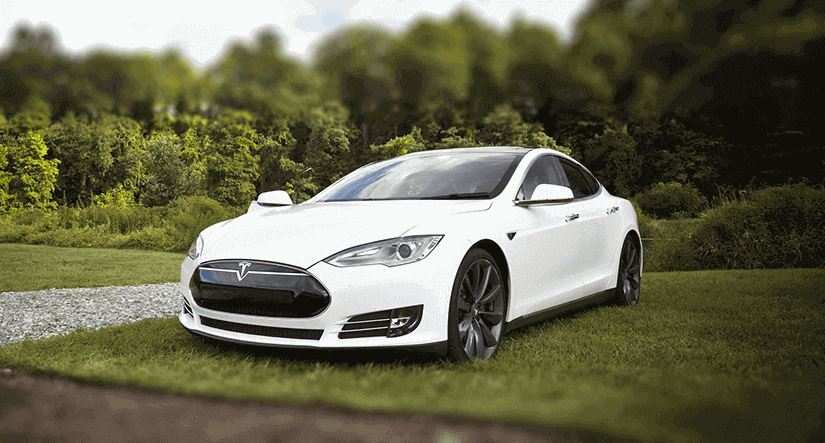
The electric car revolution is revving up in Britain and our polluting, fossil fuel powered cars are gradually being replaced by eco-friendly electric and hybrid alternatives. There are currently around 184,000 electric vehicles (EVs) on UK roads but experts predict this to skyrocket to 9 million by 2030.
Electric vehicles are still relatively expensive to buy, but thanks to government grants, road tax breaks, low running costs, and cheaper models entering the market, they’re becoming more affordable by the year. In this guide, we look at the types, costs, financial incentives and pros and cons of EVs to help you decide if your next car should be electric.
Contents:
What are electric and hybrid cars?
From the outside, electric cars look just like any other, but under the hood, they are quite different!
Simply put, electric vehicles (EVs) are vehicles that are powered either fully or in part, by electricity, instead of solely relying on petrol or diesel. They use an in-built battery pack to power an electric motor that needs to be recharged regularly, just like a laptop or smartphone. Electric cars can either be 100% electric or combined with a traditional gas-powered engine to form a ‘hybrid’ car.
By using electricity instead of fossil fuels, electric cars not only offer significant benefits to the environment because of their lack of or reduced exhaust emissions, but drivers also benefit from super cheap running costs. Recharging with electricity costs just a fraction of the price of a full tank of petrol or diesel. Fully EVs also require very little maintenance to keep them running efficiently, as they have fewer moving parts than combustion engines. This means they are much more economical over time compared to traditional cars.
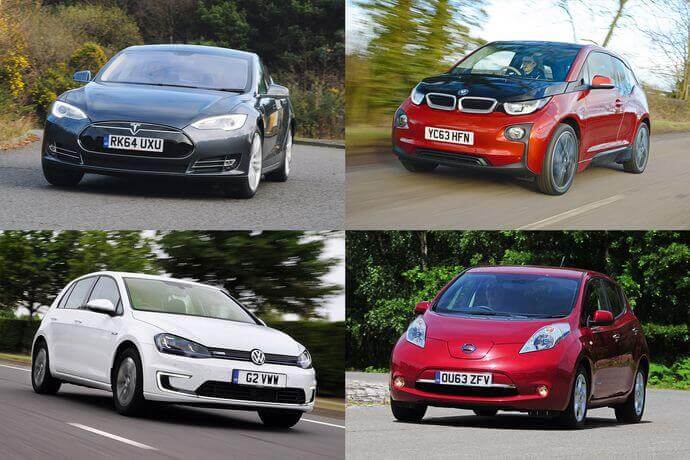
There are now over 120 models of electric vehicle in the UK. Image: Auto Express
Electric vehicles in the UK
Whilst countries such as Norway, where one third of cars sold are electric, are pushing ahead with electric cars, here in the UK we’ve been a little slower on the uptake - only 2.2% of new cars registered in 2017 were electric or hybrids.
Nevertheless, in recent years, electric car sales have seen a huge boost. According to Next Green Car, there are 178,000 plug-in electric cars currently registered in the UK, along with 6,100 plug-in vans, and around 120 different models of electric vehicle. This has grown rapidly from just 3,500 registered EVs in 2013. This upward trend seems destined to continue as manufacturers continue to innovate, improve the technology, and reduce manufacturing costs.
The British government is also boosting the industry through financial incentives such as grants and tax breaks. They’ve also announced plans to ban all manufacturers from selling any petrol or diesel cars from 2040 onwards.
Types of electric vehicle
There are three main types of electric cars available on the market, which are differentiated by how much electricity they’re powered by. EVs can either be 100% electric or ‘hybrids’ - a car powered by both an electric motor and a petrol or diesel engine.
Battery Electric Vehicles (BEVs)
Battery electric vehicles are powered entirely by electricity and no fuel whatsoever. Being completely electric means they don’t have an engine, exhaust pipe or any fuel tank, just an electric motor. They are recharged by simply connecting a cable from a home or public EV charging point to the car’s battery. BEVs are the most environmentally-friendly form of electric vehicle and give off zero harmful emissions. One of the most well known and popular BEV manufacturers are the US-based EV trailblazers Tesla, who only design and build 100% battery electric vehicles.
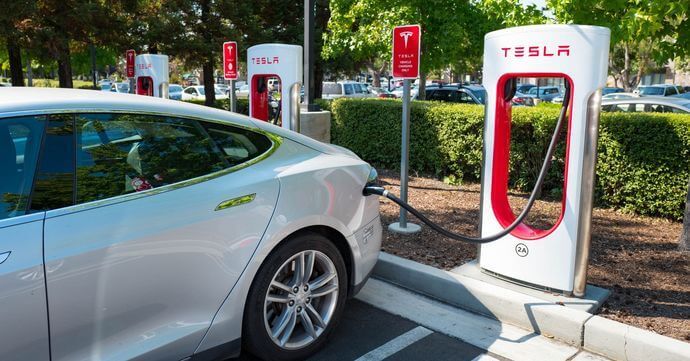
Tesla are one of the most popular manufacturers of BEVs. Image: CNet
Hybrid Electric Vehicles (HEVs)
HEVs combine an electric, battery-powered motor with a petrol or diesel engine, meaning either can be used to power the car, depending on the speed and distance. However, unlike BEVs, the batteries don’t actually need to be charged by plugging into a charging point. Instead, HEVs recharge their own batteries using clever technology called ‘regenerative braking’.
With regenerative braking, the motor captures the kinetic energy the car generates when slowing down, and converts it to electrical power to recharge the battery automatically. This electricity is then used to power the engine when the vehicle accelerates again. It only captures a small amount of energy, but it’s enough to power the electric motor on short journeys and it’s entirely free!
At low speeds, HEVs use the electric motor for power but when speeding up, the petrol engine takes over. This means they are eco-friendly on short stop-and-start journeys around town, but not when putting your foot down on the motorway.
Plug-in Hybrid Electric Vehicles (PHEV)
PHEVs are similar to hybrid electric vehicles and are powered by both a petrol engine and an electric motor with a battery. The difference, however, is that they need to be charged by a plug-in charger and have much larger batteries as a result. This means they can travel greater distances using electricity than an HEV can, plus still have petrol or diesel as a backup.
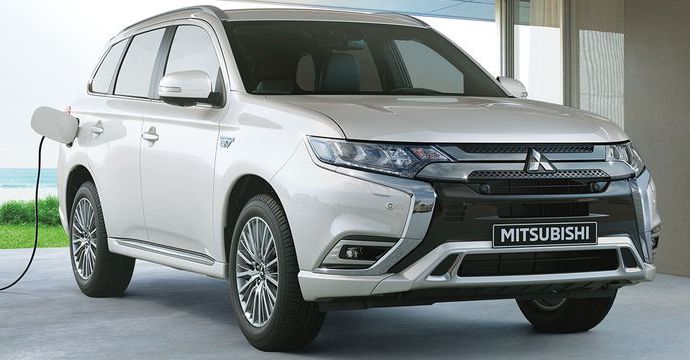
The Mitsubishi Outlander PHEV is the UK's best selling electric car. Image: Mitsubishi
Benefits of electric cars
1. Environmental benefits
Clearly, a major benefit of electric cars is the reduced impact on the planet. Petrol and diesel Cars and other road vehicles are some of the worst offenders when it comes to emitting harmful greenhouse gases such as CO2 - a major contributor to climate change. Fully electric cars do not release any harmful exhaust emissions at all and even hybrids emit less while running on electricity. This also has the the knock-on effect of improving our air quality and general health.
EVs are also increasingly being manufactured from recycled materials, further adding to their green credentials. Cars such as the Nissan Leaf, for example, have parts made from recycled plastic including old water bottles and plastic bags, as well as parts from scrapped cars.
2. Charge at home
If you have space in a garage or a driveway for example, you can reap the benefits of installing a home EV car charger. Simply plug it in overnight and wake up to a fully juiced car! Plus, if you have solar panels installed on your property, you can connect them up to your EV charger via a solar battery to power your car with solar energy, sourced straight from your roof, cutting out the middleman altogether.
3. Cheap to run
Fully electric cars are typically much cheaper to run and maintain. Electric motors have fewer moving parts, there is no oil to change and batteries can last many years before needing to be replaced. Reduced car maintenance means fewer trips to the garage and therefore lower costs to keep the car running efficiently.
Fueling them is also much cheaper. To charge most electric vehicles with a home EV charger costs around £3 to £4. According to Pod Point, a full charge for the Nissan Leaf will usually cost around £3.64 using a home EV charger, if charged overnight using low-cost electricity on a specialist EV tariff from one of the UK’s many renewable suppliers.
To charge at a public charging point such as those installed by energy supplier Ecotricity, the cost is around £6.50 for a 30 minute fast charge. Tesla owners can even charge their cars for free with the ‘Tesla supercharger’ network of charging points located across the UK.
4. Generous EV grants
The British government is keen to promote electric cars and to increase uptake, so they are offering the ‘Plug-in Car Grant’ of up to £4,500 towards the cost of buying the car. They also offer a grant of up to £500 for installing a home EV charger to further reduce the upfront investment. Such significant financial support certainly makes EVs that bit more affordable and appealing to a larger percentage of drivers.
5. Reduced taxes
100% electric vehicle owners also enjoy financial benefits in the form of reduced taxes - another government incentive to help encourage more of us to buy electric vehicles. Not only do EV owners not have to pay any road tax at all, but they’re also exempt from paying the congestion charge in London.
Disadvantages of electric cars
Whilst there’s no doubt EVs are the future, the technology is still developing and so there are some aspects that can’t yet match up to the convenience and costs of fossil-fuel powered cars.
1. EVs are expensive
The number one drawback of electric cars is still the initial cost to buy them. Whilst there are an increasing number of more affordable models being released and generous government grants available, electric vehicles are still more expensive than petrol or diesel cars. Even second-hand electric cars can be difficult to find for less than £10,000, unless you go for one of the small, budget EVs such as the Nissan Leaf or Renault Zoe.
2. Slow to charge
As we all know, topping up a petrol or diesel-powered car is easy at any local garage and you can be in and out with a full tank of fuel in five minutes flat.
Unfortunately, charging electric cars is not as quick. Whilst electric cars can recharge to 80% in just 30 minutes at a public ‘rapid chargepoint’, charging at home can take up to 12 hours, meaning many EV owners must charge their car overnight.
3. Accessibility of charging points
As electric car technology is so new, there aren’t as many public charging points located throughout the UK as there are petrol garages. As mentioned above, there are around 18,200 public charging points for the 184,000 electric vehicles in the UK. One public charger for every 10 EVs may sound like more than enough, but whilst chargers are in abundance in large cities, there are far fewer available in rural areas.
How far you live from a public charging point has been referred to as a ‘postcode lottery’. Londoners, for example, have an abundance of public chargers - around 4,200 according to Zap-Map. Wales on the other hand has fewer than 600 to cover the entire country!
The ability to recharge at home is also not always possible as not all properties have adequate outside space such as a driveway or garage to install a charger. EV owners that live in flats or terraced houses on narrow streets for example, can only recharge at public charging points.
4. Safety concerns - are electric cars too quiet?
As electric cars run on electric motors, they are far quieter, especially at low speeds. To many, this is a plus point in terms of the reduced noise pollution. However, others have argued recently that in fact, the silence of electric cars is a danger to pedestrians, and that they should be forced to make some sort of noise in order to prevent accidents with unaware pedestrians.
To help prevent accidents, a law will come into force in July 2019 that will ensure all new electric cars that are manufactured will have to emit some form of noise at low speeds to warn pedestrians of their presence.
How much does an electric car cost?
Electric cars are still a relatively modern invention and as such the technology is still pricey for car manufacturers to produce - at least until production volumes are large enough to bring costs down.
One of the original electric car brands Tesla, who market their cars at the premium end of the market, have prices starting at a cool £68,000 new, or from around £35,000 used for their Model S.

At the very peak of the EV market is the Tesla Roadster supercar which they claim is “The quickest car in the world, with record-setting acceleration, range and performance.” It can reach 60 miles per hour in just 1.9 seconds and cover over 600 miles, but to get your hands on one will set you back an eye-watering £189,000!
However, in recent years manufacturers such as Nissan have released more affordable EVs for the mass market to enable more people to go green. For example, the latest model of the Nissan Leaf starts at around £23,000, but the older models can be bought used for less than £10,000. A far more affordable way to get in on the EV action.
Prices of UK’s top 10 best selling electric cars
Here are the ten most popular electric and hybrid models sold in the UK between 2015 and 2018 according to Next Green Car, and the typical retail and used prices of each.
| # | Model | Price from (new) | Price from (used) |
|---|---|---|---|
| 1 | Mitsubishi Outlander PHEV | £34,255 | £12,699 |
| 2 | Nissan Leaf | £22,790 | £6,750 |
| 3 | BMW 330e | £36,685 | £15,765 |
| 4 | BMW i3 | £29,575 | £14,499 |
| 5 | Mercedes Benz C 350e | £37,875 | £18,467 |
| 6 | Tesla Model S | £67,650 | £40,250 |
| 7 | Volkswagen Golf GTE | £33,400 | £15,805 |
| 8 | Renault Zoe | £17,420 | £5,800 |
| 9 | BMW 530e | £45,810 | £26,999 |
| 10 | Volvo XC90 T8 Twin Engine | £61,900 | £45,990 |
All prices are shown with government grants applied where applicable. New car prices are sourced from manufacturers’ websites, for the latest models and without any optional upgrades. Used car prices sourced from motors.co.uk. Prices correct as of October 2018.
Electric car grants
In order to encourage more drivers to switch to electric and hybrid vehicles, the UK government currently offers a grant, as a financial incentive to reduce the upfront cost of buying the car. The Plug-in Vehicle grant is a scheme available to anyone buying from a specific selection of government-approved electric vehicles.
The amount you could receive towards buying an electric car depends on the category of vehicle. The government has set seven different categories based on the car’s miles covered without emissions. The grants available range from 20% to 35% of the total cost of the vehicle.
These grants are valid until October 2018, however, there are fears the government may cut the overall budget available for electric vehicle grants when the scheme comes up for review.
“Rumours suggest the Treasury will need to find "emergency funds" to avoid reducing these subsidies, potentially harming Britain's green ambitions. The maximum grant for Category 1 cars like the Nissan Leaf, Renault Zoe, Hyundai Ioniq Electric and BMW i3 could fall to £3,500, while the £2,500 grant for plug-in hybrids may be abolished entirely.”
As it stands, the government’s overall budget for the plug-in car grant is already set to decrease to £124m for 2018-2019, and £96m for 2019-2020. This means that for new EV buyers, some of the grants could drop by up to £1000, while some will be cut altogether.
Which electric vehicles are eligible for a grant?
Category 1 vehicles
Electric vehicles that have CO2 emissions up to 50g/km and that can cover at least 70 miles without any emissions are categorised as ‘Category 1 vehicles’. Customers buying cars in this category can receive a 35% grant, up to a maximum of £4,500 towards the total cost. This includes many of the top 10 best sellers.
- BMW i3 and i3s
- Nissan LEAF
- Renault ZOE
- Tesla Model S
- Tesla Model X
Category 2 vehicles
Electric vehicles that have CO2 emissions up to 50g/km and that can cover at least 10 miles without any emissions. Customers buying cars in this category can receive a grant of 35% of the cost of the car, up to a maximum of £2,500. This category also includes some top 10 bestsellers.
- BMW 330e
- Mercedes-Benz C350e
- Mitsubishi Outlander PHEV
- Volkswagen Golf GTE
- Volvo XC60 Twin Engine
The grant is also available towards the costs of electric vans, motorcycles, mopeds and taxis. To view the full list of eligible EVs, visit the government’s webpage on low-emission vehicle grants.
Electric Vehicle Homecharge Scheme (EVHS)
The government also offer another grant of up to 75%, a maximum of £500, towards the purchase and installation costs of a home electric car charging point, limited to one per household. The idea around this scheme is to increase the availability of EV charging points, and again to make electric cars more appealing and affordable for drivers to boost the percentage of electric cars on the roads.
Electric car chargers
Keeping your electric car charged is the most difficult aspect of owning an EV. All it takes is a simple charging cable to connect up to a charging point, however public EV chargers are not as abundant as traditional petrol and diesel garages yet. This is slowly improving though, as companies such as Ecotricity and Tesla continue to install new charging points up and down the UK.

As some (usually older) models of electric cars struggle to travel 100 miles before they need to be recharged, ‘range anxiety’ - the fear that you’ll run out of power before you reach the next charging station can be a real problem. It’s one thing for your smartphone to go flat whilst out and about, but your car running out of charge in the middle of nowhere is an altogether bigger issue! Since you can’t simply carry and install a spare battery yourself, if the battery dies your car will have to be towed to the nearest charging station.
Types of EV chargers
There are various different types of electric vehicle chargers that offer different electrical capacities and that can charge an EV in various time scales.
Slow chargers (6-8 hours)
Slow chargers are designed to charge a car over a longer period, with just 3kW of capacity. Slow chargers are typically installed in homes so EV owners can charge their car overnight at a low cost.
Fast chargers (3-4 hours)
Fast chargers offer more power, at 7kW to 22kW and can fully charge an EV in just a few hours.
Rapid chargers (30 mins)
Rapid chargers are the fastest way to charge an EV and can reach 80% charged in just half an hour and have a capacity of 45kW to 50kW. These are usually found at service stations along motorways and are designed for EV drivers to recharge quickly whilst taking a break.
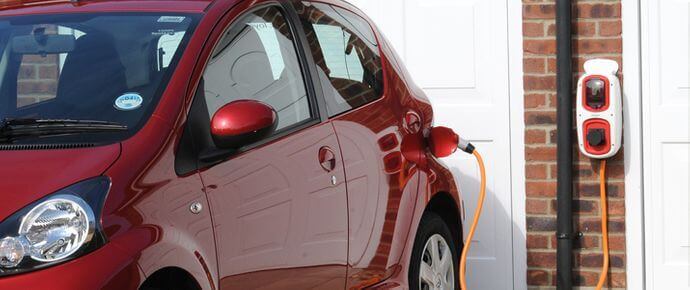
Home EV chargers
Many electric car owners opt to install a home EV charger. These are usually installed on the outside wall of a house or in a garage and hooked up to the house’s electricity supply. Since electric cars take many hours to fully charge, it is much more convenient to have your own charger at home. Plus, depending on where you live, public electric charging points can be few and far between, especially for those living out in the sticks.
Where to buy home EV chargers
Home EV chargers can be bought from electric car manufacturers such as Tesla or various speciality retailers. Buying and installing a charger on your property typically costs between £750 and £1500. However, once you have applied the Home Charge Grant of up to 75% (up to £500) this cost can be cut down significantly.
A select few renewable energy suppliers including Tonik Energy and Ovo Energy also sell home EV chargers alongside energy tariffs. Others, such as Octopus Energy also offer specialist EV energy tariffs for charging your car at home with low-cost renewable energy.
Tonik eoMINI Charger

- From £239
(inc. £500 grant) - Buy here
Tesla Wall Connector
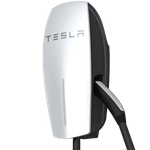
- £460
(inc. £500 grant) - Buy here
Octopus Energy Zappi

- From £495
(inc. £500 grant) - Buy here
Public electric car charging points in the UK
Recent statistics from Zap-Map show that there are over 18,200 public electric car chargers located across almost 6,500 locations across the country, as of October 2018. This has grown from just 1,500 in 2011 and the network looks set to continue to increase even more over the next few years to keep up with rising electric car sales.

How many miles can an electric car drive on a single charge?
EV technology may still be in its infancy, but electric cars’ maximum ranges are improving fast as manufacturers design more efficient and longer-lasting batteries. Whilst they used to struggle to top 100 miles on a single charge, many now exceed this. Models such as the Tesla Model S, for example, can exceed 300 miles - that’s enough to drive from London to Newcastle non-stop!
However, the distance an EV can cover in a single trip also depends on:
- How fast and smoothly you drive
- How often you accelerate and break
- How many electrical devices are in use whilst driving (radio, sat nav, heating etc)
The distances an EV can cover also depends on the model of the car. Let’s take a look at how many miles the top 10 best selling electric cars can typically reach on a full charge.
| # | Model | Estimated range on full charge |
|---|---|---|
| 1 | Mitsubishi Outlander PHEV | 22 miles (on electric) |
| 2 | Nissan Leaf | 151 miles |
| 3 | BMW 330e | 14 miles (on electric) |
| 4 | BMW i3 | 160 miles |
| 5 | Mercedes Benz C 350e | 20 miles (on electric) |
| 6 | Tesla Model S | 304 miles |
| 7 | Volkswagen Golf GTE | 31 miles (on electric) |
| 8 | Renault Zoe | 250 miles |
| 9 | BMW 530e | 28.5 miles (on electric) |
| 10 | Volvo XC90 T8 Twin Engine | 24 miles (on electric) |
Estimated ranges sourced from manufacturer's websites in October 2018.
Should you buy an electric car in 2020?
If you’re in the market for a new motor, we think it’s a great time to buy an electric vehicle.
Not only are prices starting to fall but there are also generous government grants available to reduce the cost even further. More and more models are being released too, giving car buyers an increasing selection of EVs to choose from. As a result, the stock of used cars is also expanding which is ideal if you’d rather not fork out the hefty retail prices.
The technology is also improving, meaning the latest models can cover more miles than in previous years, whilst more and more public charging points are popping up across the UK. As EV ownership increases, we expect the charging infrastructure will too, meaning ‘range anxiety’ will eventually become a thing of the past.
Of course, you also have to take into consideration other things such as whether you have space outside your home to install a home EV charging point, or how many public chargers are available in your local area. So if these pose an issue for you, then a hybrid may be the way to go.
